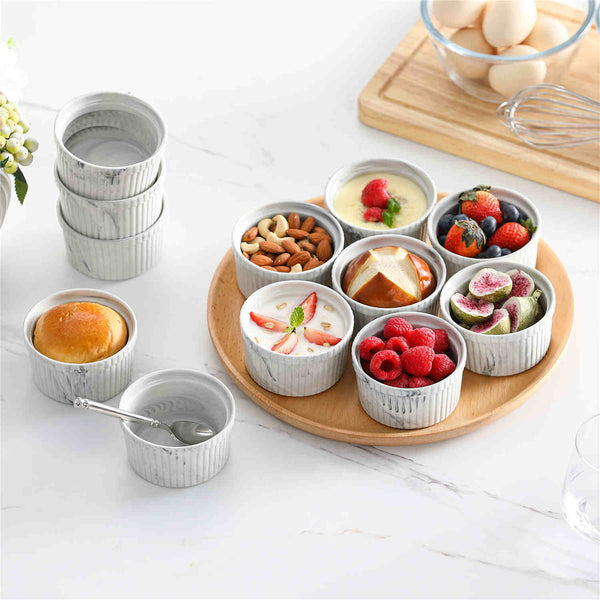The Ultimate Guide to Baking Dishes: Materials, Uses, and Recipes for Home Cooks
This guide covers a complete breakdown of the best baking dishes for any recipe you plan to make. Learn about dish types, different materials, stackable options, stylish serveware, and easy baking ideas.
Baking is not a simple task; it is an art and a science, and like any craft, the right equipment can be key to success. The baking dish at the core of every home baker's kitchen is the lovely baking dish. There are so many choices when it comes to size, shape, and material that picking one can be daunting. That's why we've created this comprehensive guide, covering everything from choosing the right baking dish to making it both functional and stylish.
Whether baking brownies, airy casseroles, or quiches, the right dish impacts both cooking results and presentation.
Understanding Different Types of Baking Dishes and Their Uses
What Exactly Is a Baking Dish?
Baking dishes are heat-safe containers used to bake most foods with dry heat. Choosing the perfect cooking dish not only means you enjoy hassle-free uniformly cooked food, that it retains its building but also helps you prepare a range of food items, from sweet delicacies, and desserts to savory main courses.
Common Types
Baking dishes come in various categories, typically divided by shape and purpose:
Each baking dish shape serves a purpose, ensuring even baking and ideal results for specific recipes.
Rectangular Or Square Casserole is perfect For Casseroles, Brownies, and baked pasta. Their even, crispy edges allow for cooking consistency and perfect crisp corners.
Round Cake Pans are ideal for making sponge cakes, cheesecakes, and tarts. The round shape allows cakes to rise evenly and perfectly maintain their shape.
Loaf Pans is for bread, meatloaf, and pound cakes. They have a permanent moist center and shape up to the well-defined slab.
Ramekins is perfect for single portions, such as souffles and crème brûlée. Being small, they cook evenly with little cooking fuss and look beautiful on any plate.
Pie dishes are the best choice for pies and quiches. They usually have fluted or flat rims to properly support flaky crusts and ample fillings.
Choosing the Right Material: Glass, Ceramic, Metal, Porcelain and More
Selecting the right material for your baking dish can make a noticeable difference in the way your food bakes, browns, and presents at the table. Each type of material behaves differently in the oven, so understanding the strengths and limitations of each can help you achieve the best results.
Pros and Cons of Different Baking Dish Materials
Glass is best for casseroles and other baked pasta. It heats slowly but retains its heat long after baking. The transparency also allows you to see how much it is browning, but it can shatter as glass does with thermal shock.
Ceramics is aesthetically pleasing, serve-ready, cooks evenly, and retains heat well. It is good for lasagna and pudding. However, it may be thick and chips readily.
Metal (Aluminum/Stainless Steel) is great for heat conduction, best for cakes, muffins, and cookies. However, it doesn't work great with acidic foods.
Porcelain bakeware looks fancy and has better heat retention properties, making it ideal for delicate dishes. Porcelain is oven-safe, durable, and stylish, but it is delicate and more expensive than other materials.
Heat Conductivity and Retention Properties
The way a dish is going to radiate and absorb will differ dramatically that may affect your results in the oven while baking.
Metal heats and cools quickly, so you have more control over your bake times, which is important for recipes that need to come out of the oven at just the right moment.
Ceramics takes longer to heat up as compared to metal, but are steady in warmth throughout baking and after. This is great for foods like baked ziti, or cobblers, that you want to serve hot and bubbly.
Porcelain is more delicate but otherwise similar to ceramic with fairly reliable. It is the best non-toxic bakeware.
Best Materials for Specific Recipes and Cooking Techniques
Choose glass for casseroles, backs of pasta or for any dish where depositing the layers and browning is better seen from the side.
Metal, such as aluminum or stainless steel, excels at heat conduction, making it perfect for cakes, muffins, and cookies.
Ceramic or porcelain performs best for elevated baked dishes like a soufflé, cobbler, gratin, and all that go from oven to table. They're also perfect for dessert recipes served this way, such as slow-baked bread pudding or fruit crisps.
Essential Baking Dishes Every Kitchen Needs
Starter Set for Beginners
For beginners, start with these five essential pieces:
Glass or ceramic 9x13-inch dish is useful for casseroles, roasted meats, and baked pasta.
An 8×8 metal or ceramic pan is perfect for brownies, cornbread, or any baked side.
A 9x5-loaf pan is perfect for banana bread or meatloaf.
We can also be a 9-inch round cake pan for cakes, deep-dish pizza, or frittatas.
A regular muffin tin is great for cupcakes, muffins, or other baked goods intended to be portioned out or even for a savory dish or two.
With these, you'll be equipped to tackle most basic baking recipes.
Space-Saving Solutions for Small Kitchens
Look for nesting dishes that fit perfectly inside each other.
Opt for Multipurpose things, like a ceramic bowl, which can also serve as a serving tray.
Use silicone bakeware when you need collapsible, versatile options.
From Oven to Table: Stylish Baking Dishes for Serving
Dual-Purpose Baking Dishes That Enhance Presentation
No more using metal pans to actually serve food from, In fact, a lot of baking dishes these days are intended to be a serving dish as well.
Enameled stoneware is a stylish addition to any dining table.
Function meets flair with white porcelain bakeware that features handles.
The hand-painted white baking dish lends your table a rustic or bohemian feel.
Choose materials and colors that complement your kitchen and dining room style.
Color and Design Inspiration
Neutral hues like white, taupe, and gray offer timeless elegance suitable for any decade. However, if you wish to infuse color, then, opt for navy, forest green, or terracotta. These are modern kitchen staples and will elevate your serving game.
Pair them with linen tablecloths and wooden serving boards for a complete look.
Building a Cohesive Collection
Start with a focused collection using one or two main materials, such as ceramic or metal.
For a cohesive appearance, select a uniform color scheme.
Use an aesthetic piece to anchor your collection, such as a large oval casserole dish.
Recommended Baking Dish Recipes
Now that you have got the gear let’s put it to use!
Sweet Treats
The best Brown Butter Blondies are best in a square ceramic dish.
Peach Cobbler is served in a rustic stoneware dish.
Lava Cakes are the smaller versions that come in cute ramekins, delivering the ideal portion sizes with a touch of theatricality.
Savory Favorites
Old-fashioned oven baked Mac and Cheese looks wonderful on the deep glass casserole for the crusty surfaced conclusion.
Spinach and Feta Quiche create a stunning view in a porcelain tart pan.
Stuffed bell peppers look appealing in a 9×13 pan, which also allows for easy cleanup.
One-Dish Weeknight Dinners
For a flavorful dinner, grab some quick sheet pan fajitas that look delicious and effortless in a metal-baking tray.
It will keep it warm on the table, so chicken and broccoli are cooked with baked teriyaki chicken.
Stack taco elements in a glass casserole dish and serve hot.
Final Thoughts: Your Perfect Baking Dish Awaits
Baking dishes not only aid in cooking but also enhance the culinary experience and add character to your kitchen. Whether you prefer the quick-heating, heat retention found in metal pans, or the rustic feel of a porcelain baker, there are dishes of all types available for all types of dishes.
As you learn how shape, size, and material come into play, you can create a collection for how and what you cook, where it lives in your kitchen, and what looks good on the table. The next time you want to use that old pan, maybe you should think about upgrading to dish that does double duty in the oven and on the plate.









Leave a comment